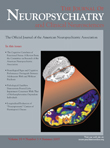A Report of Successful Treatment of Psychosis in Epilepsy With Risperidone
SIR: Several research studies 1 have assessed the prevalence of psychiatric disorders in epilepsy and reported that 2% TO 7% of patients with epilepsy have comorbid psychosis. Clinically, psychotic symptoms of epilepsy are categorized into ictal, posticta, and interictal psychoses. 2 , 3
A family history of psychosis, earlier age of onset of epilepsy, complex partial seizures, temporal lobe lesion, and borderline intellectual functioning were the most identified risk factors for the development of interictal psychosis. 4 – 7 The onset of the psychotic symptoms in epilepsy is variable and the most common features are hallucinations and paranoid delusions. 8 , 9
Case Report
A 42-year-old Caucasian male was diagnosed between the ages of 3 and 5 years with complex partial seizure disorder after a traumatic brain injury and he had received antiepileptic medications. The patient was the only sibling to a couple who did not have a family history of seizure disorder or other neurological disease or psychiatric illness. He had borderline intellectual functioning, received special education, attended vocational school, and was able to hold a part-time job.
At the age of 37, the patient experienced increased frequency of his seizure activity (6 to 8 incidents of activity per month), despite his adherence to the antiepileptic medication regimen. When his antiepileptic medications were adjusted by his neurologist, he reported a decrease in frequency of his seizure activity (none or 1 to 2 incidents per month).
At that time, he started having episodes of auditory hallucinations, hearing incoherent voices and paranoid delusions, and believing that people are against him. No history of affective flattening or thought blocking or lack of motivation or social withdrawal was reported.
His magnetic resonance image of the head was normal and his electroencephalogram indicated slowing and sharp waves originating in the right temporal region. His CBC and blood chemistries were within normal limits. His urine toxicology was negative.
The patient was hospitalized for the above-noted psychotic symptoms seven times in 3 years. He was prescribed different antipsychotic medications, in sufficient doses and for an appropriate duration of time, on both an inpatient and outpatient basis. Despite his compliance, he did not show a significant improvement in his psychotic symptoms, especially his paranoid delusions. A regimen of risperidone was prescribed for his psychosis and was titrated to 4 mg daily. The patient demonstrated amelioration of his psychotic symptoms and he has been free of psychosis for 2 years.
Comment
The mechanism by which epilepsy may be associated with the psychotic episodes is not well known; it is likely that structural brain abnormalities cause both epilepsy and psychosis. 3 Several studies reported that seizures modify the presentation of the psychosis; psychosis complicates epilepsy when seizures are frequent. 3
Researchers reported that about 50% of epileptic patients with psychosis could be diagnosed with schizophrenia. 8 Psychosis of epilepsy is distinguishable from schizophrenia by the lack of negative symptoms of schizophrenia and better premorbid personality. 8
Treatment of psychosis of epilepsy requires more careful pharmacological treatment, considering the ability of the antipsychotic medications to provoke seizures. 10
In our case, risperidone was associated with a clinically significant improvement of the psychotic symptoms without exacerbation of the seizure activity.
1 . Gaitatzis A, Trimble MR, Sander JW: The psychiatric comorbidity of epilepsy. Acta Neurol Scand 2004; 110:207–220Google Scholar
2 . Kanemoto K, Tsuji T, Kawasaki J Reexamination of interictal psychoses. Epilepsia 2001. Jan; 42(1): 98–103Google Scholar
3 . Sachdev P: Schizophrenia-like psychosis and epilepsy: the status of the association. Am J Psychiatry 1998; 155:325–336Google Scholar
4 . Quin P, Xu H, Lauren TM, et al: Risk for schizophrenia and schizophrenia-like psychosis among patients with epilepsy. BMJ 2005; 331:23Google Scholar
5 . Adachi N, Matsuura M, Hara T et al: Psychoses and epilepsy: are interictal and postictal psychoses distinct clinical entities. Epilepsia 2002; 43:1574–1582Google Scholar
6 . Adachi N, Matsuura M, Okubo Y et al. Predictive variables of interictal psychosis in epilepsy. Neurology 2000; 55:1310–134Google Scholar
7 . Nowack WJ: Psychiatric disorders associated with epilepsy. An article on e-medicineGoogle Scholar
8 . Kaufman DM: Seizures, in Clinical Neurology for Psychiatrists, 5th ed. New York, Saunders, 2001, pp 226–267Google Scholar
9 . Sadock BJ: Mental disorders due to a general medical condition, in Synopsis of Psychiatry: Behavioral Sciences/Clinical Psychiatry, 9th ed. Edited by Sadock BJ. Philadelphia, Lippincott, Williams, Wilkins, 2002, pp351–370Google Scholar
10 . Guarnieri R, Hallak JE, Walz R, et a: Pharmacological treatment of psychosis in epilepsy. Rev Bras Psiquiatr 2004; 26:57–61Google Scholar



